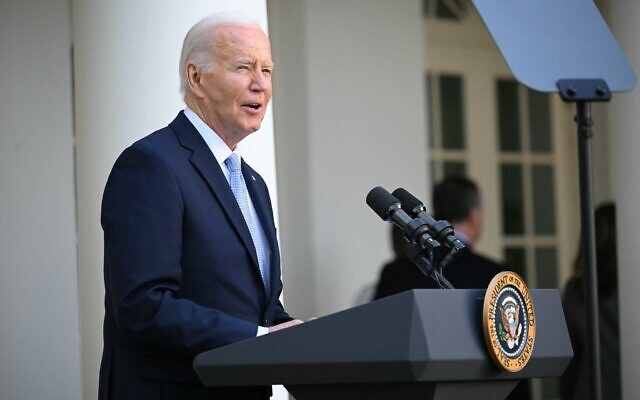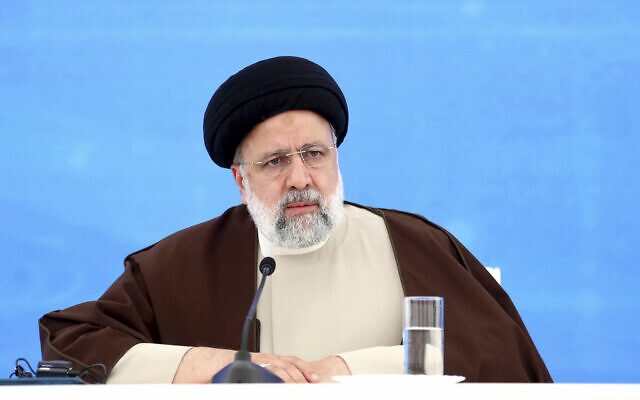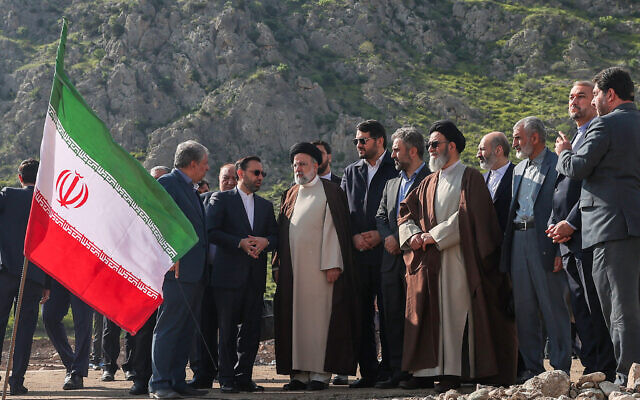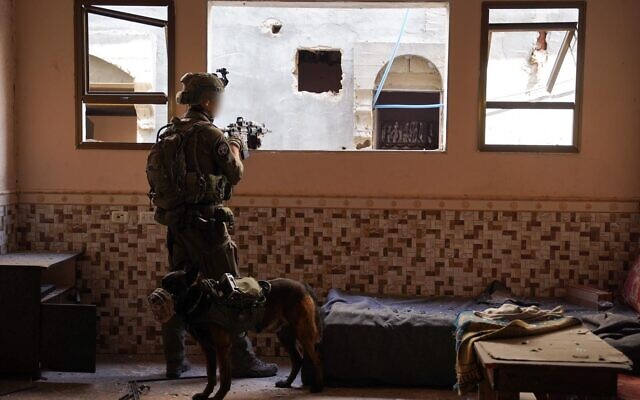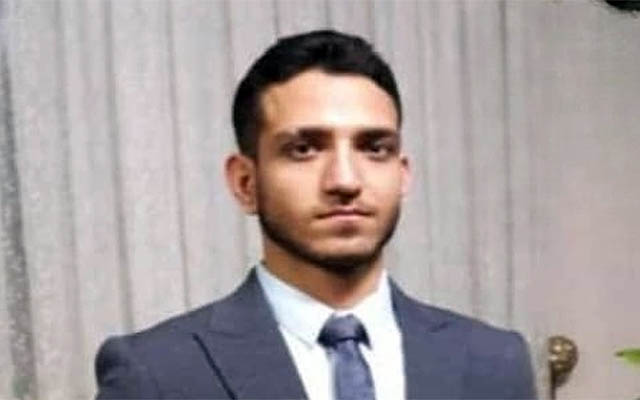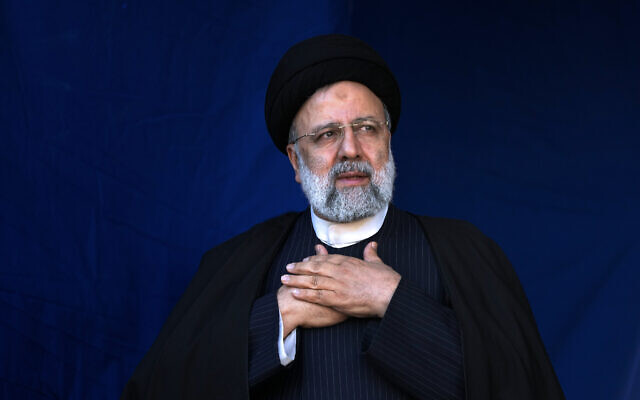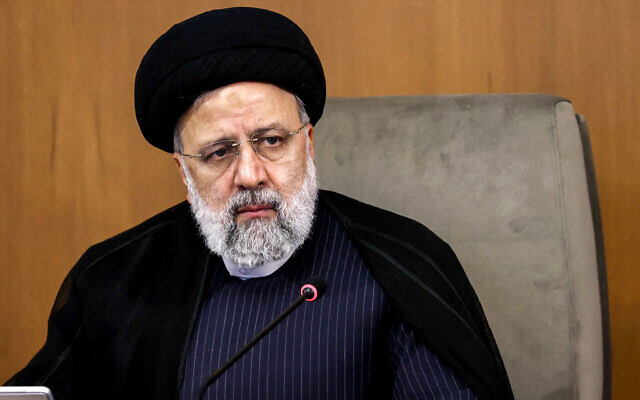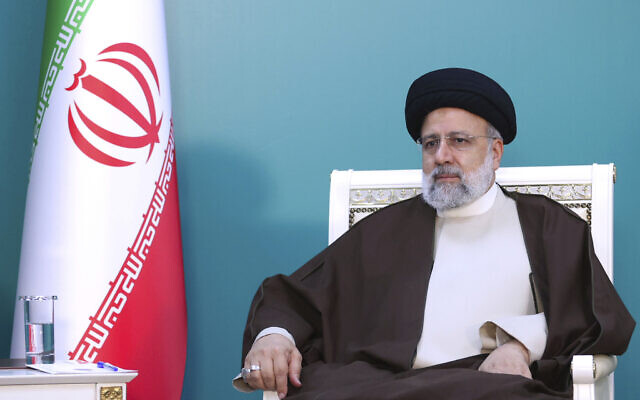Fighting breaks out at UCLA as counter-protesters confront pro-Palestinian encampment
Police drive wedge between rival rallies amid punching, kicking, and beatings with sticks; LA Mayor Karen Bass calls violence ‘abhorrent and inexcusable’
LOS ANGELES, California — Dueling groups of pro-Palestinian and pro-Israeli protesters clashed Wednesday at the University of California, Los Angeles, grappling in fistfights and shoving, kicking and using sticks to beat one another as days of tensions over the war in Gaza burst into outright violence.
The brawl took place hours after police burst into a building at Columbia University in New York City that had been taken over by pro-Palestinian protesters and broke up a demonstration that had paralyzed the school, as a wave of anti-Israel protests sent shockwaves through college campuses across the United States and elsewhere.
New York City Mayor Eric Adams said about 300 people had been arrested and he blamed the protests on outside agitators, but without offering concrete evidence.
At UCLA, riot police wearing helmets and face shields formed lines and slowly separated the groups after several hours of scuffles between demonstrators. The move appeared to quell the violence.
The fighting took place after several days of rising friction between demonstrators protesting Israel’s war against the Hamas terror group and counter-protestors, who tried to pull down barricades and plywood built by pro-Palestinian activists to protect a protest encampment.
Video showed fireworks exploding over and in the encampment. People threw chairs and at one point a group piled on a person who lay on the ground, kicking and beating them with sticks until others pulled them out of the scrum.
It was not clear how many people were injured.
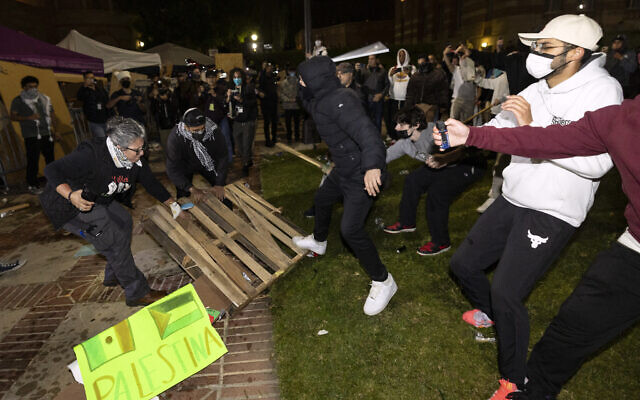
“We had people (spraying) us, beating us with bats and sticks, throwing whatever they could to us and none of this law enforcement was here at all. So it’s kind of disappointing that we’re seen as the perpetrators here,” said pro-Palestinian student protester Sophia Sandino.
The Los Angeles Police Department said it had responded to a request from UCLA to restore order and maintain public safety “due to multiple acts of violence within the large encampment on their campus.”
All of this was being posted and filmed and UCLA did nothing?
— Luc Bernard (@LucBernard) May 1, 2024
Fighting between the groups first broke out on Sunday, raising the temperature at the LA school. A day later, video shared on social media showed a pro-Israel activist being shoved by a taser-wielding protester.
Tent encampments of protesters calling on universities to stop doing business with Israel or companies that support the war against Hamas have spread across the country in a student movement unlike any other in the 21st century, reaching from New York to Texas and California. Some Jewish students say the protests have veered into antisemitism and made them afraid to set foot on campus.
Safety concerns have prompted police to take action in some locations, leading to confrontations with law enforcement and more than 1,000 arrests. In rarer instances, university officials and protest leaders struck agreements to restrict the disruption to campus life and upcoming commencement ceremonies.
The crackdown by police on some college campuses has stirred echoes of the much larger student protest movement during the Vietnam War era.

Los Angeles Mayor Karen Bass called the violence at UCLA “absolutely abhorrent and inexcusable” on social media platform X.
On Tuesday, school officials informed the protesters that the encampment was unlawful and violated university policy. UCLA Chancellor Gene Block said it included people “unaffiliated with our campus,” though he provided no evidence of the presence of outsiders.
“Many of the demonstrators, as well as counter-demonstrators who have come to the area, have been peaceful in their activism,” Block wrote in a letter posted on the university website on Tuesday.
Hundreds of counter protesters showed up at UCLA to beat the crap out of the protesters there after a girl was beaten unconscious for being Jewish. pic.twitter.com/wAIWgMmfAX
— Ian Miles Cheong (@stillgray) May 1, 2024
“But the tactics of others have frankly been shocking and shameful. We have seen instances of violence,” he said.
“These incidents have put many on our campus, especially our Jewish students, in a state of anxiety and fear.”
Pro-Israel counterprotestors started tearing down @UCLA encampment barriers and screamed "Second nakba!" referring to the mass displacement & dispossession of Palestinians during the 1948 Arab-Israeli war. Per @latimes @safinazzal on the scene with another video: pic.twitter.com/zSplnd1bYO
— Teresa Watanabe (@TeresaWatanabe) May 1, 2024
Security was tightened Tuesday at the campus after officials said there were “physical altercations” between factions of protesters.
The Jewish Federation of Los Angeles said in a statement that it was “appalled” by the violence, adding: “The abhorrent actions of a few counter-protestors last night do not represent the Jewish community or our values. We believe in peaceful, civic
discourse.”
However, it cast the blame for the clashes on “the lack of leadership from the Chancellor and the UCLA administration” by failing to crack down on “illegal encampments,” refusing to punish staff members who violate the school’s code of conduct, and being “systemically slow to respond when law enforcement is desperately needed.”
The federation urged the school’s management to “immediately close the encampment and reestablish deterrence,” and to meet Jewish community leaders and elected officials to lay out plans to keep Jews and others safe on campus.
Israel and its supporters have branded the university protests as antisemitic, while Israel’s critics say it uses those allegations to silence opposition. Although some protesters have been caught on camera making antisemitic remarks or violent threats, organizers of the protests, some of whom are Jewish, say it is a peaceful movement aimed at defending Palestinian rights and protesting the war.
Los Angeles Councilwoman Katy Yaroslavsky, whose district includes UCLA, posted on X: “Everyone has a right to free speech and protest, but the situation on UCLA’s campus is out of control and is no longer safe.”
On the other side of the country, New York City officers entered Columbia’s campus Tuesday after the university requested help, according to a statement released by a spokesperson.
A tent encampment on the school’s grounds was cleared, along with Hamilton Hall where a stream of officers used a ladder to climb through a second-floor window. Protesters had seized the hall at the Ivy League school about 20 hours earlier.
“After the University learned overnight that Hamilton Hall had been occupied, vandalized, and blockaded, we were left with no choice,” the school said. “The decision to reach out to the NYPD was in response to the actions of the protesters, not the cause they are championing. We have made it clear that the life of campus cannot be endlessly interrupted by protesters who violate the rules and the law.”
A few dozen people were arrested at the building after protesters shrugged off an earlier ultimatum to abandon the encampment Monday or be suspended and unfolded as other universities stepped up efforts to end demonstrations that were inspired by Columbia.
Fabien Lugo, a first-year accounting student who said he was not involved in the protests, said he opposed the university’s decision to call in police. “This is too intense,” he said. “It feels like more of an escalation than a de-escalation.”
Just blocks away from Columbia, at The City College of New York, video posted on social media by news reporters on the scene late Tuesday showed police putting some people to the ground and shoving others as they cleared people from the street and sidewalks following a standoff outside the public college’s main gate.
While media is covering Columbia University, this is the scene at City College of New York in Manhattan. God bless the NYPD.
pic.twitter.com/krzEATR40L— Raymond Arroyo (@RaymondArroyo) May 1, 2024
After police arrived, officers lowered a Palestinian flag atop the City College flagpole, balled it up and tossed it to the ground before raising an American flag.
Brown University, another member of the Ivy League, reached an agreement Tuesday with protesters on its Rhode Island campus. Demonstrators said they would close their encampment in exchange for administrators taking a vote to consider divestment from Israel in October. The compromise appeared to mark the first time a US college has agreed to vote on divestment in the wake of the protests.
Meanwhile, at Northern Arizona University in Flagstaff, police in riot gear closed in on an encampment late Tuesday and arrested about 20 people for trespassing, at least one of whom was thrown to the ground. University officials had warned earlier in the day that students would face criminal charges if they did not disperse.
First-year student Brayden Lang watched from the sidelines. “I still know very little about this conflict,” he said. “But the deaths of thousands is something I cannot stand for.”
The nationwide campus protests began at Columbia in response to Israel’s offensive in Gaza. War erupted on October 7 when the Palestinian terror group Hamas led a massive cross-border attack on Israel that killed 1,200 people, mostly civilians, amid numerous atrocities. The roughly 3,000 attackers who burst into southern Israel also abducted 253 people of all ages who were taken as hostages to the Gaza Strip.
Vowing to stamp out Hamas and topple its regime in Gaza, Israel launched a military campaign that also aims to free the hostages, of whom 129 remain in captivity, some believed no longer alive.
At least 34,400 Palestinians have been killed and over 77,600 injured in Gaza since the start of the war, the Hamas-run health ministry in the Strip says.
The figures cannot be independently verified and include some 13,000 Hamas gunmen Israel says it has killed in battle. Israel also says it killed some 1,000 terrorists inside Israel on October 7.

As ceasefire negotiations appeared to gain steam, it wasn’t clear whether those talks would lead to an easing of protests.
Columbia’s police action happened on the 56th anniversary of a similar move to quash an occupation of Hamilton Hall by students protesting racism and the Vietnam War.
The police department earlier Tuesday said officers wouldn’t enter the grounds without the college administration’s request or an imminent emergency. Now, law enforcement will be there through May 17, the end of the university’s commencement events.
In a letter to senior police officials, Columbia president Minouche Shafik said the administration made the request that officers remove protesters from the occupied building and a nearby tent encampment “with the utmost regret.”
New York City Mayor Eric Adams said on MSNBC’s “Morning Joe” that police had to move into Hamilton Hall “for the safety of those children.”
He again blamed outside agitators for the building takeover — an idea Shafik has also raised, though neither provided specific evidence to back up the contention, which was disputed by protest organizers and participants.
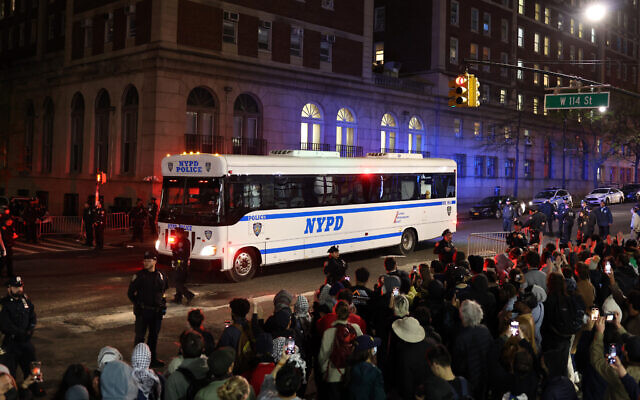
The police department’s deputy commissioner for public information, Tarik Sheppard, said 40 to 50 people were arrested at Hamilton Hall and that there were no injuries.
Protesters first set up a tent encampment at Columbia almost two weeks ago. The school sent in police to clear the tents the following day, arresting more than 100 people, only for the students to return.
Negotiations between the protesters and the college came to a standstill in recent days, and the school set a deadline for the activists to abandon the tent encampment Monday afternoon or be suspended.
Instead, protesters defied the ultimatum and took over Hamilton Hall early Tuesday, carrying in furniture and metal barricades.
Ilana Lewkovitch, a self-described “leftist Zionist” student at Columbia, said it’s been hard to concentrate on school for weeks. Her exams have been disrupted with chants of “Say it loud, say it clear, we want Zionists out of here.”
Lewkovitch, who is Jewish, said she wished the current pro-Palestinian protests were more open to people like her who criticize Israel’s war policies but believe there should be an Israeli state.



